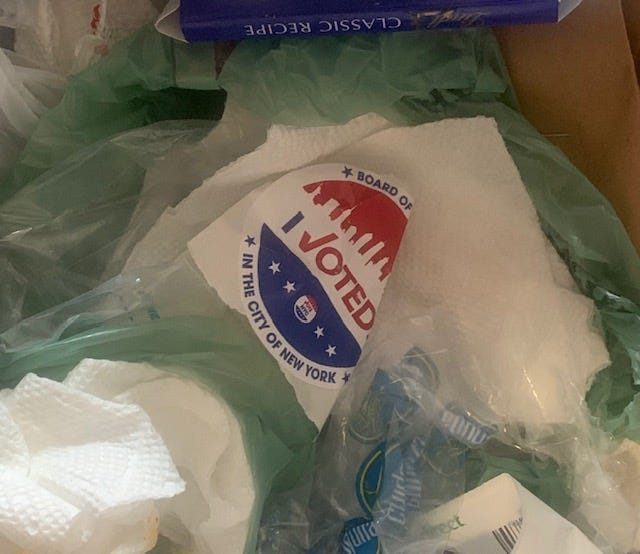New Yorkers need a break from political election talk. Starting with the presidential primary in 2015, elections have been top of mind. Now with RCV, we can sit back and let the process roll before having to think about the general election, the 2022 midterms, and the gubernatorial primary.
That is why this will be the last election-focused 2xParked for a bit. We will resume other programming pronto. In the meantime, here are a few of my thoughts from last Tuesday’s primary.
MVP of the Night
The most important endorser in this primary election cycle was not any individual. Sure, AOC endorsing Maya Wiley unified the progressive vote, but given the recent negative publicity of Stringer and Morales, the vote was trending that way.
Rather, the NY Times Opinion Page was the big winner. This should be the golden endorsement for Dems, especially in a crowded field of candidates in less considered races.
We see that the three major Times endorsements received a huge bump in the polls when comparing the poll prior and after. Brad Lander was polling pretty poorly as late as May, and he had already received the AOC endorsement a couple months prior.
The Times endorsements publicized these elections, and even if the voters did not exactly follow, the recommendations provided a north star to these new primary considerations. What is notable is the decline in “Undecided/Other” in the polls before and after the endorsements.
Number to Victory
Here are the key numbers which defined each mayoral candidate’s campaign.
4% - Andrew Yang: This is how Yang was polling from the latest Monmouth poll before he dropped out of the presidential race. This was good when you compare to Bill de Blasio, but 4% is about how much Tom Steyer and Tulsi Gabbard were polling at one point. To those who say “Yang did well because he was already known,” I would argue his rise to front runner was due to on-the-ground campaigning and good PR staff.
18 - Maya Wiley: This is the time in days before the election in which Wiley could advertise an AOC endorsement. They talked about “Maya-mentum”, but if their co-campaigning had been done a month or two prior, I wonder if the impact could have been larger. This did not leave a lot of time to include commercials (like Lander had) or even pamphlets.
2 - Scott Stringer: Given the publicized issues of Stringer and that AOC ranked him 2nd, I wonder if he was her original first choice. Along with Stringer’s long public history and electoral success, an AOC endorsement might have unified the progressive side with a bit of the established side of the party. This really would have given the election a different look.
11K - Eric Adams: Adams said Tuesday night to young journalists that “Twitter is not academic research.” As of last Tuesday, Adams’ Twitter account was not blue check certified and he had only received 11,000 new Twitter followers in the past 6 months. That is compared to 100k for Yang and 60k for Wiley. If we have learned anything from the 2016 presidential election, our bubbles are not representative samples of the whole.
4 - Kathryn Garcia: As I alluded to above, the big move for Garcia was the NY Times endorsement, which grew her support four times in magnitude and made her the most popular choice of Manhattan.
MayorModel
Much of the conversation post-election will be the power of the “progressive” vs “moderate” side of the NYC Dem party. Progressives will call Tuesday a victory. Others will call Tuesday a disappointment. In reality, the truth lies in the grey area people are afraid to discuss.
To those thinking progressives had a bad night, they won some key races. This includes the Lander + Johnson domination for city comptroller, as well as picking up many city council seats. This is likely due to good grassroot campaigning to influence the mostly undecided/less publicized elections.
To those thinking progressives had a great night, Wiley’s unification of the progressive vote was not a great performance. The mayor election was actually what people followed and why they came out to vote. On paper, Wiley is a good candidate with great experience and good stage presence (she was an MSNBC analyst). Instead of focusing on her, the focus towards the end was on her stance as progressive. As I have reiterated over and over again, relatability and character mean more than policy in elections, but that relatability was deemphasized by her campaign.
The greyness says that there will be a lot of progressive policies out of this new regime, especially by the city council. It also says that the majority of NYC Dem voters are not voting based on these politics. We have seen progressive candidates voted in as mayor already (we just have had one for 8 years), so it does not mean that side is dead. Instead, it means they need to be more relatable to more constituents for larger scale elections, not just the base.
As we begin tallying the votes, I have completed 10,000 simulations based on the existing totals and a few assumptions. I am fairly confident in Adams’ chances. This lead will likely shrink a bit after absentee ballots are included, but his lead is so big it will be difficult for Wiley or Garcia to catch up.
To subscribe to future newsletters, click here.
For more content, follow 2xParked on Twitter @2xParked.
Comments? Suggestions? Questions? Email me at 2xParked@gmail.com.






